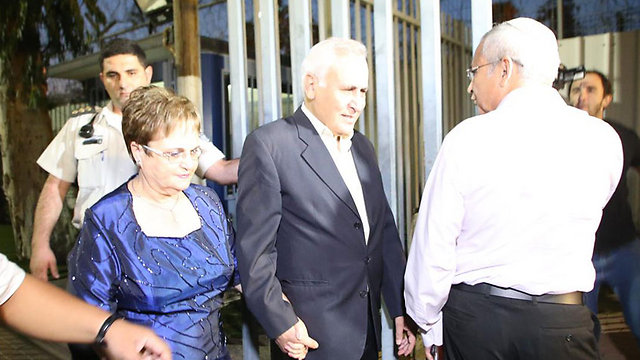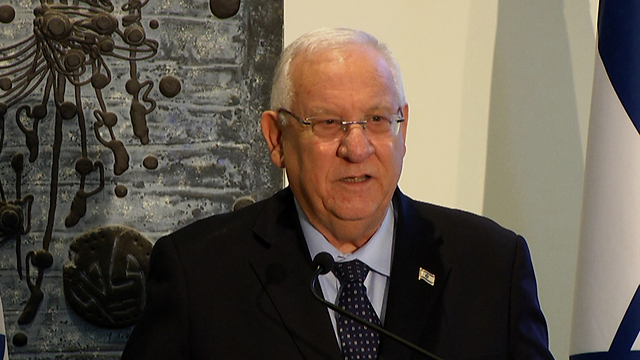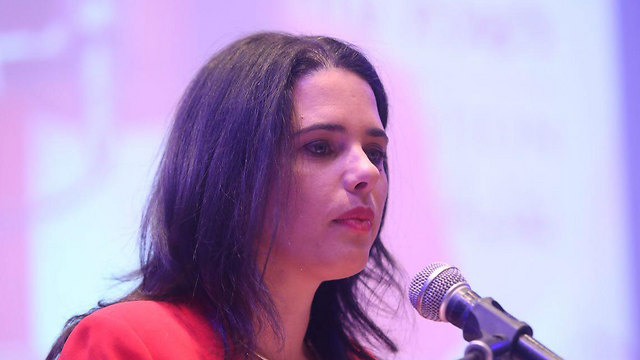
President Rivlin to consider granting clemency to former president Moshe Katsav
Moshe Katsav's attorneys and family claim his mental health is seriously deteriorating. Rivlin's office denies he ever supported Katsav's early release: 'I will state my position if and when it becomes necessary.'
Close associates of Katsav, including his family and his attorneys, publicized information which support claims of the extreme deterioration of his mental health.
His family and attorneys have posited that the decline seriously intensified following a decision taken by a parole board last month which rejected his appeal to reduce his sentence by a third. The parole board issued strong criticism of his personal behavior and subsequently justified their decision.
“There is no doubt whatsoever in the hearts of the committee members that the release of the prisoner—with his denying that he committed any crime and with his not underoing any treatment during his prison term—would constitute a real blow to public faith,” the committee’s letter read.
Katsav decided against appealing the parole board’s decision, since he apparently fell into a deep depression and claimed that he had lost all faith in the legal process relating to his release.
The information regarding his mental health was communicated to Rivlin’s office alongside two clemency requests for Katsav. The first was submitted by Katsav’s wife, Gila, while the second was by Katsav's lawyer, Zion Amir.
New requests are expected to be filed in the coming days by Katsav’s defense team in which the rapid deterioration of his mental stability over the last few weeks will be cited as grounds for his early release.
According to a senior official, requesting amnesty from the president is unconventional shortly after the parole board has already ruled on the case. However, the Basic Law: The President of the State's clause 11 grants Rivlin the power to award clemency: "The President of the State shall have power to pardon offenders and to lighten penalties by the reduction or commutation thereof." He may exercise this power in light of new evidence deemed to warrant the use of clemency.
In the majority of cases, this power is only used in circumstances involving the severe health deterioration of a prisoner. Indeed those privy to the circumstances of Katsav’s health conditions, which they claim are bordering on madness, believe that a pardon could possibly be granted.
Legal officials confirmed that clemency appeals will indeed be submitted shortly by Katsav’s lawyers, which will first be reviewed by Minister of Justice Ayelet Shaked.
The officials expressed confidence that Rivlin would view the appeals positively if accompanied by a certified psychiatric evaluation which would attest to Katsav’s mental regression.
Prior to the release of the parole board’s decision, reports that Shaked and Rivlin had expressed their support for Katsav’s early release began to circulate. The President’s Residence however, denied such reports: “The president did not express support for granting clemency to Katsav. The president will discuss this subject and will make clear his position if and when it becomes necessary to do so in the same manner that he handles all other appeals for clemency brought before him.”
Shaked was equally unequivocal when she stated over a month ago that she has no intention of becoming involved in the parole board's proceedings: “The board, which conducts its proceedings independently and is headed by a judge, takes into account many criteria according to the law such as, inter alia, public risk, behavior in prison, rehabilitation of the prisoner and more. Confession and regret do not constitute criteria (for early release) according to law, but they are obviously considered by the board with respect to the prisoner’s ability to be rehabilitated.”













